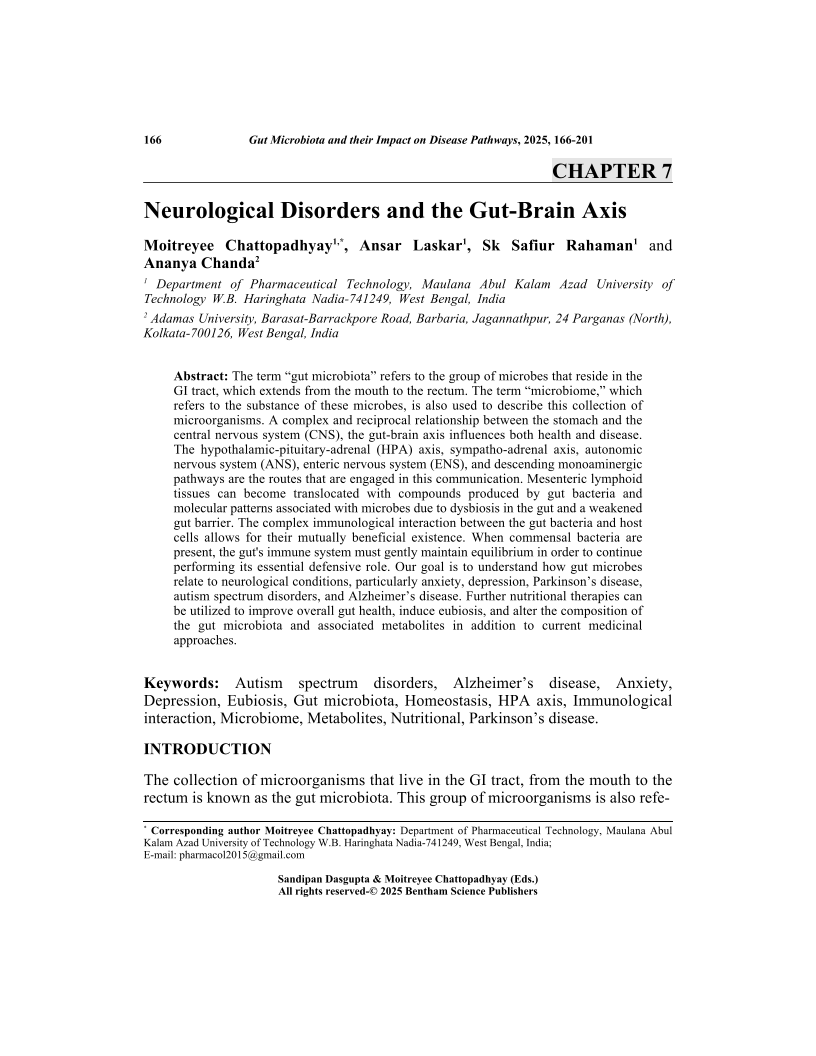Neurological Disorders and the Gut-Brain Axis

- Authors: Moitreyee Chattopadhyay1, Ansar Laskar2, Sk Safiur Rahaman3, Ananya Chanda4
-
View Affiliations Hide Affiliations1 Department of Pharmaceutical Technology, Maulana Abul Kalam Azad University of Technology W.B. Haringhata Nadia 741249, West Bengal, India 2 Department of Pharmaceutical Technology, Maulana Abul Kalam Azad University of Technology W.B. Haringhata Nadia-741249, West Bengal, India 3 Department of Pharmaceutical Technology, Maulana Abul Kalam Azad University of Technology W.B. Haringhata Nadia-741249, West Bengal, India 4 Adamas University, Barasat-Barrackpore Road, Barbaria, Jagannathpur, 24 Parganas (North), Kolkata-700126, West Bengal, India
- Source: Gut Microbiota and their Impact on Disease Pathways and Interventions , pp 166-201
- Publication Date: April 2025
- Language: English
Neurological Disorders and the Gut-Brain Axis, Page 1 of 1
< Previous page | Next page > /docserver/preview/fulltext/9789815324549/chapter-7-1.gif
The term "gut microbiota" refers to the group of microbes that reside in the GI tract, which extends from the mouth to the rectum. The term "microbiome," which refers to the substance of these microbes, is also used to describe this collection of microorganisms. A complex and reciprocal relationship between the stomach and the central nervous system (CNS), the gut-brain axis influences both health and disease. The hypothalamic-pituitary-adrenal (HPA) axis, sympatho-adrenal axis, autonomic nervous system (ANS), enteric nervous system (ENS), and descending monoaminergic pathways are the routes that are engaged in this communication. Mesenteric lymphoid tissues can become translocated with compounds produced by gut bacteria and molecular patterns associated with microbes due to dysbiosis in the gut and a weakened gut barrier. The complex immunological interaction between the gut bacteria and host cells allows for their mutually beneficial existence. When commensal bacteria are present, the gut's immune system must gently maintain equilibrium in order to continue performing its essential defensive role. Our goal is to understand how gut microbes relate to neurological conditions, particularly anxiety, depression, Parkinson's disease, autism spectrum disorders, and Alzheimer's disease. Further nutritional therapies can be utilized to improve overall gut health, induce eubiosis, and alter the composition of the gut microbiota and associated metabolites in addition to current medicinal approaches.
-
From This Site
/content/books/9789815324549.chapter-7dcterms_subject,pub_keyword-contentType:Journal -contentType:Figure -contentType:Table -contentType:SupplementaryData105

